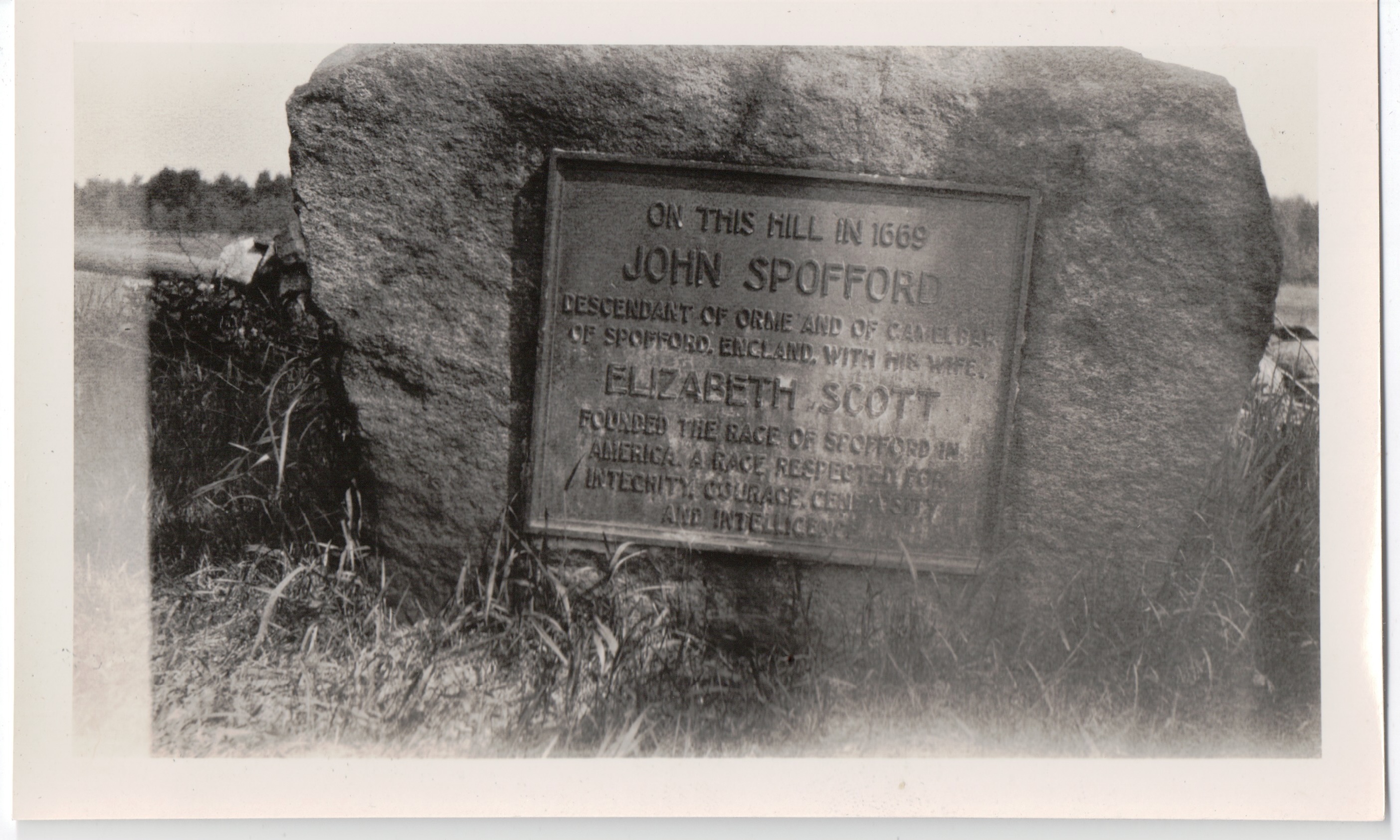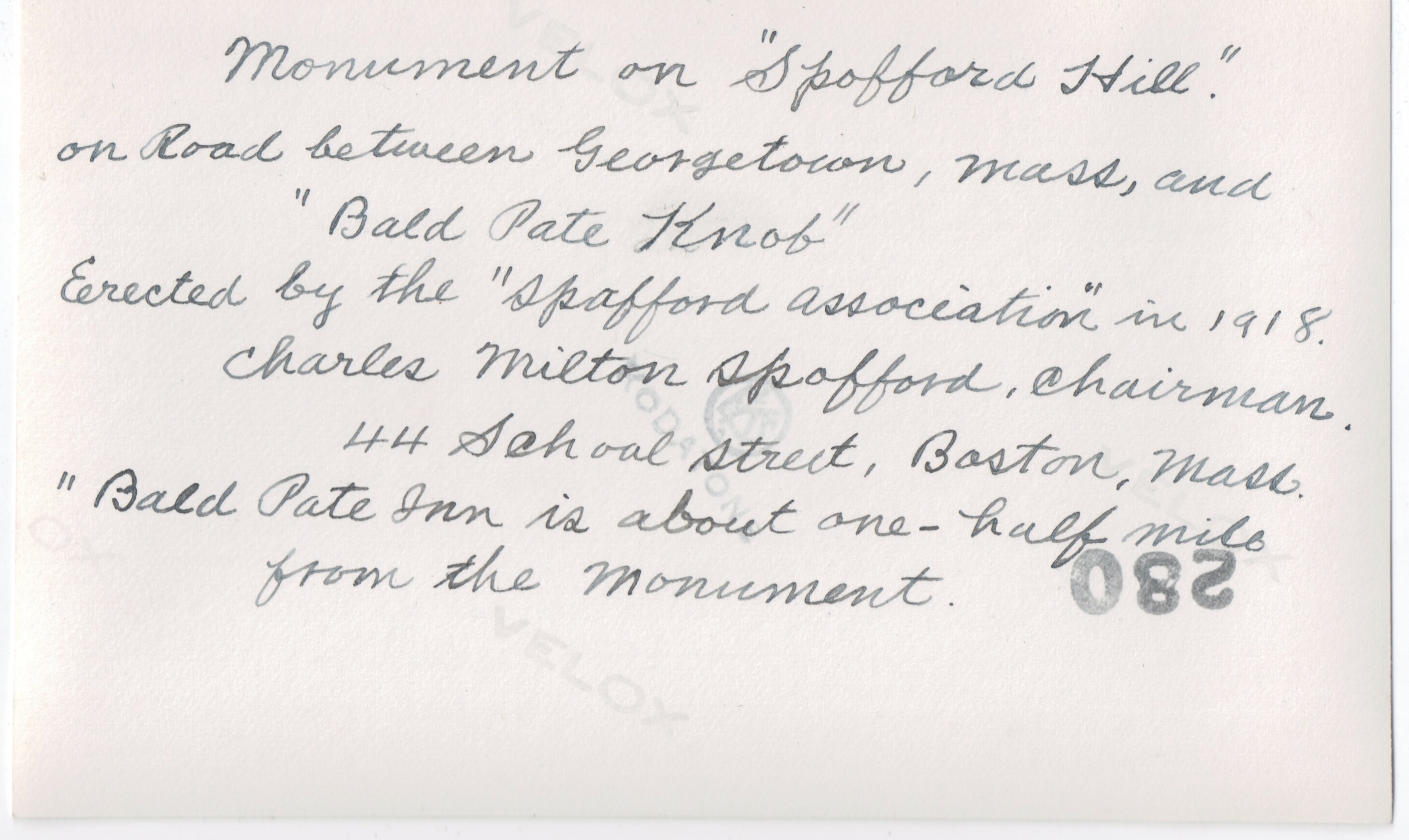Early Spoffords in the USA
Notes from the history of Georgetown, MA at https://activerain.com/blogsview/79703/history-of-georgetown
John Spofford, the first permanent settler in this western section of Rowley, built a log hut on the plateau at the crest of Andover Street in 1669. The village elders gave him a lease with certain conditions to farm the western end of the "Old Town Field on the Gravell Plain." "He is to have the benefit of the land for 21 years and the rent shall be used for the ministry or town. He may only use timber for buildings and what is necessary for farming. Any timber he may wish to sell may only be sold to the town of Rowley and no more than five loads of hay will be sold each year. Further, manure may not be given away or sold but must be placed back into the land. Finally, any buildings or fences erected by Master Spofford are to be maintained and left in good order at the end of his lease." At the end of his lease, John Spofford bought the land and, over time, many Spofford families made their homes on what became known as Spofford's Hill. On the northerly side of Andover Street close by West Street is a boulder monument with the inscription, "John Spofford, descendant of Orme and of Candlebar of Spofford, England, with his wife, Elizabeth Scott founded the race of Spofford in America, a race respected for integrity, courage, generosity and intelligence."
Spofford Monument

The Spofford monument is inscribed as follows:
On this hill in 1669 John Spofford, descendant of Orme and of Gamelbar of Spofford, England, with his wife, Elizabeth Scott founded the race of Spofford in America, a race respected for integrity, courage, generosity and intelligence
The John Spofford mentioned was born in 1612 in Yorkshire. He "...fled to America to avoid persecution, and settled in Rowley, Massachusetts, 1638, and in Spofford's Hill in 1669.". Spofford's Hill is the former name of Georgetown, MA. The persecution would have been religious, as he was apparently a puritan. His father John Spofford (1588-1668) was "...the Puritan Vicar of Silkstone..." but was "...ejected from his living as a Nonconformist in 1663..." (Notes in thie paragraph from A_Genealogical_Account_of_the_Spofforth.pdf)
An photo of the monument has the following location details written on the back. The photo is undated but is included with related photos dated May 21, 1934.

Monument on "Spofford Hill", on road between Georgetown, Mass, and "Bald Pate Knob. Erected by the "Spafford association" in 1918. Charles Milton Spafford, chairman, 44 School Street, Boston, Mass. "Bald Pate Inn" is about one-half mile from the monument.
A couple of historical notes:
- "Nonconformist" above refers to Protestants who did not conform to Church of England doctrines, which included Puritans. The 1662 Act of Uniformity required CofE conformance, which would have led to John Spofford being part of the "Great Ejection". https://en.wikipedia.org/wiki/Nonconformist
- Silkstone is located in South Yorkshire. The Church of All Saints there was constructed in the 12th century, so it may be where John Spofford was vicar. This isn't clear though. https://en.wikipedia.org/wiki/Silkstone
The monument's reference to "descendant of Orme and of Gamelbar" refers to some ancient history, old enough that it's hard to be certain of its reliability or at least of its relevance to this family tree. According to A_Genealogical_Account_of_the_Spofforth.pdf, Orme was born in Yorkshire in about 965 AD. I'm not sure how much later his grandson Gamelbar was born. Gamelbar resisted the invasion of William the Conqueror, as a result of which his estates were siezed and "...it is probable that his life paid forfeit for his patriotism" (no exact date of death is given).
The history reads like something out of Game of Thrones. Gamel (Orme's son, Gamelbar's dad) "...did not live to see the downfall of his country, and the ruin of his family and of his friends, caused by the Norman invasion, for before that time he had been treacherously murdered by [the Earl of Northumberland]." So then Gamelbar "soon avenged his father's death, by an attack on Tosti culminating in a revolt of the Northumbrians in 1065, in which many of his bodyguard were slain."
More info may be available from the Georgetown, MA historical society, https://georgetownhistoricalsociety.com/ or https://www.facebook.com/groups/georgetown.historical.society/